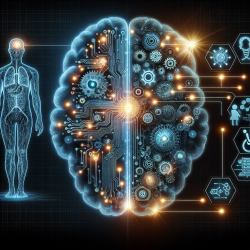Introduction
As the global population ages, the prevalence of cognitive impairment and neurodegenerative disorders is on the rise. Early detection and intervention are crucial in managing these conditions effectively. The recent research article titled Diagnostic Efficacy and Clinical Relevance of Artificial Intelligence in Detecting Cognitive Decline sheds light on the potential of artificial intelligence (AI) in revolutionizing the early diagnosis of cognitive decline.
Understanding the Role of AI
AI is rapidly becoming an integral part of healthcare, offering innovative solutions for early detection of neurodegenerative disorders. The study highlights AI's ability to aid in the early diagnosis of conditions such as mild cognitive impairment (MCI), Alzheimer's disease (AD), and Parkinson's disease (PD), among others. By leveraging machine learning algorithms, AI can analyze complex datasets to identify patterns indicative of cognitive decline.
Why Early Detection Matters
Early detection of cognitive decline is vital for several reasons:
- It allows for timely intervention, potentially slowing disease progression.
- Early treatment can help preserve cognitive function and improve quality of life.
- It provides an opportunity for patients and families to plan for the future.
AI's role in early detection is becoming increasingly relevant as it offers high accuracy in diagnosing conditions at their nascent stages.
AI Models and Their Efficacy
The research presents various AI models and their efficacy in detecting cognitive decline:
- Mild Cognitive Impairment (MCI): AI models like Support Vector Machines (SVM) and Artificial Neural Networks (ANN) have shown promising results in detecting MCI with high accuracy.
- Alzheimer's Disease (AD): Convolutional Neural Networks (CNN) and deep learning techniques have demonstrated nearly 100% accuracy in early diagnosis of AD.
- Parkinson's Disease (PD): Machine learning models using MRI and clinical data have achieved accuracy ranges from 74% to 99% in detecting PD.
These findings underscore AI's potential to transform the diagnostic landscape for neurodegenerative disorders.
Implementing AI in Practice
For practitioners looking to enhance their diagnostic capabilities, integrating AI into clinical practice can be a game-changer. Here are some steps to consider:
- Stay informed about the latest AI technologies and their applications in healthcare.
- Collaborate with technology experts to implement AI solutions tailored to your practice's needs.
- Participate in training programs and workshops to understand AI tools and their functionalities.
By embracing AI, practitioners can improve diagnostic accuracy and patient outcomes.
Encouraging Further Research
While AI shows great promise, ongoing research is essential to refine these technologies and expand their applications. Practitioners are encouraged to participate in research initiatives and contribute to the growing body of knowledge in this field.
To read the original research paper, please follow this link: Diagnostic Efficacy and Clinical Relevance of Artificial Intelligence in Detecting Cognitive Decline.










